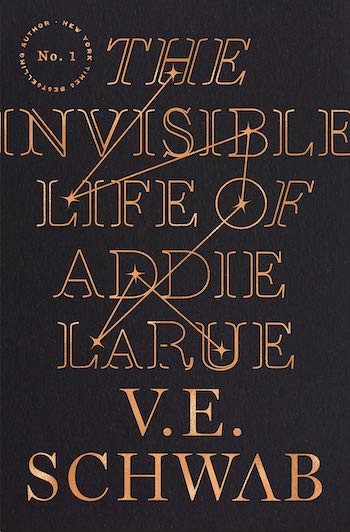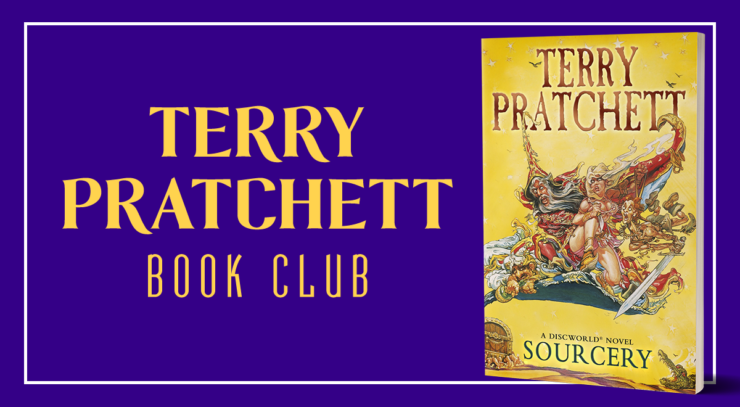Some magic-users just have a little more going for them than others. It’s time to meet them in Sourcery.
Summary
There is a wizard named Ipslore, who did something wizards are not supposed to do—he got married and had kids. Eight sons to be exact. Which means that his eighth son is a wizard squared, making him a source of magic or: a sourcerer. Ipslore is supposed to be taken by Death, but he’s angry at how he was cast aside by wizards and tells Death that he is going to influence his eighth son’s life so that he will become the Archchancellor and rule all of them. Death tells him that there must be a loophole in this prophecy. Ipslore decides that the loophole occurs if his son (named Coin) throws his staff away. Death agrees to those terms. Then Ipslore escapes death by putting himself into his old wizard staff, which is now his son’s staff. Eight years later, at the Unseen University, something is going all wrong, and Rincewind flees with the Luggage and the Librarian. Virrid Wayzygoose is supposed to be named Archchancellor of the University, but Coin arrives at the University to take the spot.
He challenges a Level Eight wizard to a duel for the Archchancellorship. Billias agrees to this duel, showing him Maligree’s Wonderful Garden, a piece of magic done by one of the last great sourcerers. Coin is not quite impressed, flipping the spell so that the garden Billias creates is larger, outside of the sphere he made for it, and the University Great Hall is now inside the sphere. Then he reverses it and shows them his own magic—he makes Billias vanish. He then dispatches Virrid is short order as well. Spelter, the university bursar, decides that they might be better off going along with the boy. Spelter allies with an eighth level wizard, Carding. They agree to give the Archchancellor hat to Coin and allow him to be a figurehead who they guide, not realizing that the hat has been stolen. The thief in question tries to recruit Rincewind to the cause, but he’s not interested. Suddenly, they are cornered by some of the Patrician’s guards, looking for the thief. They escape, and Rincewind learns that the thief stole the Archchancellor’s hat, but moreover, the hat is speaking to him.
The hat asked the thief to steal it and wants Rincewind to take it to Klatch where there is someone “fit” to wear it. They need to get out of sight, so they head into the Shades portion of the city, a incredibly dangerous district. The thief turns out to be a woman named Conina. They head into a tavern called the Troll’s Head and immediately get embroiled in a fight. Someone steals the hat and gets out. The hat freezes the fellow who tries to steal it (he later shatters), and they continue on their way. Rincewind learns that Conina is actually Cohen the Barbarian’s daughter—she actually wants to be a hairdresser, but this is where she’s landed given her genetic inheritance and predilections. The Luggage finally catches up to them (Conina is a bit mortified by it), and the hat tells them to commandeer a boat. Rincewind would rather not, but he feels compelled to do as the hat says.
The hat insists that there must be no more sourcerers, and prods at them until they give in. The next morning, the University is changing, magic is getting easier and more powerful than ever. Coin is awake and demanding to see more of the University. Spelter and Carding lead him around, and Coin begins to change things to his liking, getting rid of Archchancellor statues, making windows larger, ceilings higher, everything newer. Carding suggests Coin be made Archchancellor, but a seventh level wizard named Ivan Hakardly protests the appointment because it has not been done properly. Coin points out that wizards only seem to rule wizards and that he believes this to be a waste of time. He asks who is in charge here and the wizards suggest the Patrician, Lord Vetinari. Coin decides to go have a word with him, and draws him from his palace into the University. Lord Vetinari is irate and demands that they cease this prank, but Carding tells him off and turns him into a lizard.
Book Club Chat
I have questions about Ipslore. So many questions about him and his life and his anger. Discworld as a series is often very cavalier about wizards and their interest in romance and sex, but here’s a guy who was very interested, and made that choice, and now he’s furious with them for how that fell out, and I just want to know more about him?
And we’re back with Rincewind, who really should stop hating adventure so much because if he stopped it would probably stop hunting him down. Has anyone ever done a comparison chart between Rincewind and Bilbo Baggins? I feel like they have quite a bit in common overall, at least in terms of how they’d prefer their lives to go versus how often they are waylaid by insistent folks who demand their time and attention.
Buy the Book


The Invisible Life of Addie LaRue
The first thing that catches me in this book is Rincewind thinking how irritated he is that you’re supposed to be good at magic to be a wizard: “He knew he was a wizard, deep in his head. Being good at magic didn’t have anything to do with it. That was just an extra, it didn’t actually define somebody.” And that… is a very odd but enlightened sort of viewpoint, isn’t it? Maybe not in the sense of professions, but in the sense of how we talk about what we do in life. We get caught on the idea of quality, and let it destroy our ability to be and do things all the time. Like the hobby problem that many people have—we all think that we have to be good at the hobby to enjoy it, to do it. But expertise is not the be all and end all of life. It’s a facet. And it’s good to place value on expertise, to respect, even place importance on it for yourself. But you can adore something and not be good at it; music; the written word; math; science.
It occurs to me that Coin is very much the predecessor to Adam Young from Good Omens, and it’s interesting to see the way that Pratchett reuses and evolves concept and characters. Here we have another unnerving young boy with untold power who is ultimately too much for the world. It’s a different mechanism, but the same idea—he can create, he has inherent power rather than drawing from what already exists. The conceit of that, of the havoc that unleashes on the world, is more than anyone is capable of reckoning with at the moment.
There’s another Lord of Rings parallel here (amongst several, because we also get a steward of Gondor reference with Vetinari) with the Archchancellor hat—it’s less evil, but it definitely an object that can compel people to do its bidding.
Asides and thoughts:
- When Ipslore asks Death what there is in the world that makes living worthwhile, and he can only say CATS ARE NICE. Yes, Death.
- The image of the Luggage terrorizing people in bars for potato chips. My dog jumped up on a table and ate half a box of donuts this week, so I really do sympathize with Rincewind here.
- Casablanca throwaway aside (Of all the disreputable taverns in all the city, says the hat), I get a special sort of glee from the hat’s general impatience for people’s nonsense, particularly when Rincewind notes that the person it allowed itself to be stolen by a woman, and the hat gamely replies So was your mother.
- “It might be thought that the Mended Drum, scene of unseemly scuffles only an hour ago, was a seedy disreputable tavern. In fact it was a reputable disreputable tavern.” Okay, but this is a thing, though.
- Lord Vetinari is, of course, described in terms quite similar to Blofeld of the James Bond franchise. Just to make it extra-clear what sort of fellow we’re dealing with. (The family name is also a reference to the de Medici family who ruled Florence, Italy during the Renaissance, which is another major tell.)
Pratchettisms:
NO. I AM NOT ALLOWED TO ENLIGHTEN YOU, EVEN BY DEFAULT, ABOUT THE CURRENT TEMPERATURES IN THE NEXT WORLD.
There was no analogy for the way in which Great A’Tuin the world turtle moved against the galactic night. When you are ten thousand miles long, your shell pocked with meteor craters and frosted with comet ice, there is absolutely nothing you can realistically be like except yourself.
On the center table the complete carcass of a whole roast pig looked extremely annoyed at the fact that someone had killed it without waiting for it to finish its apple, and the model Uniersity made of butter was sinking gently into a pool of grease.
The wizards exchanged the kind of long, slow glare you could roast chestnuts on.
The silence tightened like a tourniquet.
Next week we’re heading up to “Erm,” he said, “excuse me…” See you then!










